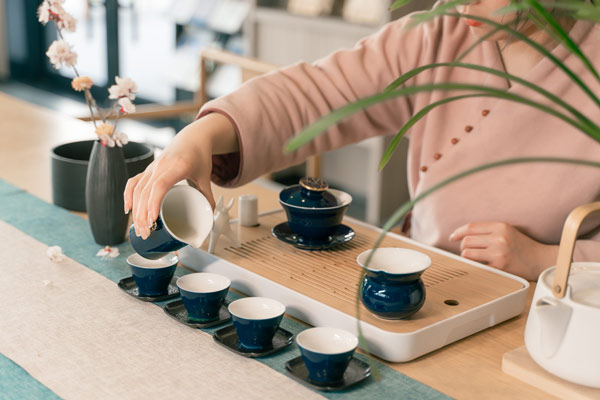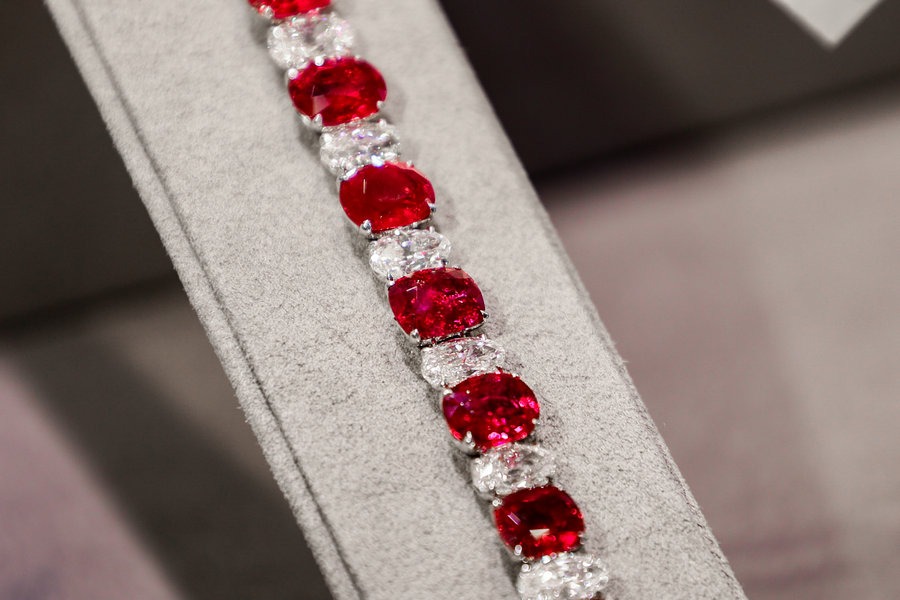Teahouses offer a perfect brew of refreshment


A faint scent of tea wafts into the air as a wooden door gently opens, revealing a classical decorative style. The location is a traditional-style teahouse hidden down an alleyway in the central Chinese city of Changsha, Hunan province. Inside the tea shop, youngsters are photographing beautiful delicacies while toying with tea sets.
Teahouses have played an important role in Chinese society since ancient times, but with the rise of urbanization, people have grown accustomed to a fast-paced lifestyle and a wider variety of entertainment options. So, the old teahouse model is progressively becoming obsolete.
Meanwhile, Chinese tea culture faces competition from coffee, milk tea and other fashionable drinks. However, an increasing number of young Chinese tea lovers are rebranding the societal value of teahouses.
The hashtag "check-in at the teahouse" has received more than 320,000 shares on Xiaohongshu, a lifestyle-focused social media platform in China. Check-in shops may be found in cities like Shenzhen of Guangdong province, Chengdu of Sichuan province, Xi'an of Shaanxi province, and Changsha, to name a few.
As a major tea-producing country, China's total domestic tea sales last year exceeded 2.3 million tons and 300 billion yuan ($44.7 billion), according to data from the China Tea Marketing Association. The demand for tea is also expected to increase among younger generations.
"I came here in admiration after seeing many influencers on social media platforms suggest new Chinese teahouses," says Liu Dan, a Changsha resident, as she and her friends prepared to meet at a teahouse. "The pace of life is too fast now, but the age-old teahouse environment and the process of boiling water to make tea make me feel comfortable and relaxed."
Some newer Chinese teahouses cater to young people by allowing customers to personalize their tea experience. Consumers can either brew their own beverage for a calm and methodical tea ceremony or simplify the steps to taste pure tea boiled by the staff.
The sense of ceremony will not diminish despite the simplification. In a teahouse called Guanji, for example, the staff will ask guests to select a cup before helping them select their tea and providing snacks.
"Many Gen Z customers visit our store and enjoy the atmosphere. The new Chinese-style teahouse caters to young people's desire for new experiences," says Ting Zhang, a store manager of Guanji Teahouse.
Young customers are instructed on the differences between tea varieties and how to complete the gongfu tea ceremony-though its name sounds like kung fu, it has nothing to do with martial arts, but rather, means focusing attention and taking elaborate effort to make the tea-a traditional tea ritual prevailing in South China's Guangdong province.
"Young people are naturally drawn to trendy drinks, but milk tea can also serve as a channel for them to learn about traditional Chinese tea. For example, as they learn more about milk tea's raw materials, they will be able to comprehend traditional Chinese tea culture," says the teahouse manager.
As a result of innovation in tea products, Chinese tea culture has transformed and taken on new meaning. The Chinese milk tea brand Modern China Tea Shop recently launched two teahouses in Changsha.
The approaches to tea making taken by modern teahouses are unique and novel, such as using coffee machines to extract tea leaves and dripping tea bags in the same way you would pour coffee. "We want to make it fun to drink," says a staff member from the Modern China Tea Shop.
"By combining modern lifestyles and tradition, we seek to popularize tea culture by making it simple and easy to prepare, drink and enjoy tea. We aim to make Chinese tea accessible, so that everyone can enjoy the pleasure and charm of it," says a staff member from another Chinese teahouse brand.
According to data analysis agency iiMedia Research, by 2021, the proportion of online Chinese tea consumers aged 19 to 30 had reached 46.8 percent, surpassing the 37.6 percent of people aged 31 to 40, indicating that tea drinking is a prominent trend among the nation's youth.
"There is a Chinese saying: 'making friends via tea'. Now, for the younger Chinese, tea drinking is becoming a social activity," says the Guanji Teahouse manager.



































